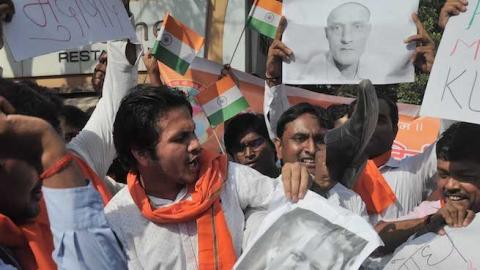Pakistan’s announcement last week that it convicted a suspected Indian spy and sentenced him to death will further disrupt already shaky India-Pakistan relations. The decision will add to the sentiment in Pakistan, carefully nurtured over the years by its government, that India remains Pakistan’s “eternal enemy” and will likely deter Prime Minister Nawaz Sharif from any new initiative to mend fences.
That India and Pakistan spy on each other isn’t much of a secret, nor is the claim by both sides that the other supports insurgencies inside its territory. But the arrest and sentencing of a spy, backed by a Pakistani (and Indian) media frenzy, will keep the pot of neighborly enmity boiling even if it is largely ignored outside the subcontinent.
Pakistan’s hypernationalist narrative already positions the country as the target of a global conspiracy and portrays its nuclear-armed military and intelligence agency as the only bulwarks against annihilation. Extremists in India, meanwhile, increasingly mirror Pakistan in advancing the idea of perennial conflict, with Subramanian Swamy of the ruling Bharatiya Janata Party, among others, calling for Pakistan’s disintegration.
Pakistan announced the arrest of Indian national Kulbhushan Jadhav in March 2016, accusing him of involvement in espionage and sabotage activities in Balochistan, Pakistan’s restive southwestern province besieged by an armed ethnic insurgency.
Pakistan’s military blames the Balochistan insurgency on “foreign governments and intelligence agencies.” Mr. Jadhav’s arrest confirmed Pakistani fears and was cited as proof by Pakistan’s media of India’s efforts to destabilize Pakistan.
Not much is known about the case except details officially provided by Pakistan. India has acknowledged that he is a former naval officer engaged in business since his retirement but denies he has any current involvement with its intelligence services. New Delhi asserts that he was abducted from Iranian Balochistan before being shown to the press by Pakistan.
The primary evidence against Mr. Jadhav seems to be a videotaped confession released last March by Inter-Services Public Relations, the Pakistan military’s official media wing, which also announced the conclusion of his secret trial. Pakistan’s civilian leaders have generally been circumspect in their pronouncements on the matter.
Under pressure from the military, some of it rather public, the Pakistani Foreign Office announced in the fall that it would compile evidence about Indian covert operations against the country, based on Mr. Jadhav’s testimony, into a dossier that would be presented to the United Nations secretary-general. An adviser to the prime minister later informed the Pakistan Senate that the material collected by the military “was insufficient,” but in January the dossier based on the already-released confession was presented to the U.N. anyway.
Pakistan has delivered similar dossiers before while acknowledging that they don’t contain “material evidence.” Their intended audience isn’t the U.N. or the international community but the Pakistani public. Unwilling to change its policy of supporting jihadist groups as an instrument of regional influence, Pakistan’s military-intelligence combine wants to ensure the primacy of its worldview at least within Pakistan.
Pakistani military intelligence maintains a large “M” (media) wing that threatens mainstream journalists, tries to influence reporting on Pakistan by foreign media and ensures that civilian politicians, journalists and intellectuals who question its narrative of a permanently besieged Pakistani state are projected as agents of a Zionist-Hindu cabal. Islamabad was also an early adopter of fake news sites used to promote everything from the country’s capital to building the image of its top army commander.
According to the Pakistani hypernationalists, civilians advocating normalization of relations with India, or advocating close ties with the U.S. or recognition of Israel, are all seeking to sell out Pakistan. It isn’t unusual to find pictures on the internet of dissenting Pakistanis, including me, with Stars of David, American flags or Hindu insignia painted across our foreheads. Similar abuse is targeted at scholars and journalists who promote views disfavored by the military-intelligence complex.
Mr. Jadhav’s conviction for espionage would have been more convincing if it had resulted from an open trial. But as with much about Pakistan, the trial’s short and secretive timeline may have more to do with internal dynamics than with the merits of the case itself. Mr. Sharif had recently renewed calls for improving relations with India. Putting an Indian on death row is an easy way to scuttle momentum for new talks.
At a time when India is also sliding into Hindu religious fervor, with vigilante violence threatening the country’s minorities over protecting cows that are considered sacred, Pakistan’s spy games can only make it tougher for the two South Asian neighbors to even explore peace, let alone find it.















